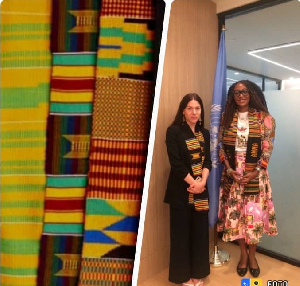 The documentary among other things highlights how kente was popularized in the United States
The documentary among other things highlights how kente was popularized in the United States
Ghana has made history with the UNESCO inscription "Craftsmanship of traditional woven textile Kente" on its Intangible Cultural Heritage list.
This momentous recognition, bestowed during the 19th Session in Paraguay on the 4th of December 2024, underscores the profound artistry and cultural value of Kente weaving, deeply rooted in the Northern, Ashanti, and Volta Regions of Ghana.
The inscription solidifies Ghana's rightful claim to Kente, emphasizing its distinctive techniques and time-honored traditions. This accolade ensures the preservation of Kente for generations to come.
The Ministry of Tourism, Arts, and Culture wholeheartedly applauds this remarkable accomplishment and champions the safeguarding of Africa's rich and diverse cultural heritage.
“The inclusion of Kente in this prestigious list is a proof of our commitment to protecting our rich Ghanaian cultural traditions and sharing them with the world. It also reinforces Ghana’s position as a leader in cultural heritage preservation and promotion on the international stage,” a statement by the Ministry of Tourism, Arts and Culture signed by Andrew Andrew Egyapa Mercer read in part.
Amma Prempeh who was bestowed the honor title of Kente Ambassador recently and an active promotor of the kente cloth and its other derivatives through her philanthropy and her documentary, which happens to be Ghana’s first Kente Culture Story documentary film 'the Importance of Kente to Ghanaians & Black Africans', shared her excitement about this feat which anchors on the intricate artistry, cultural and political significance of Ghana’s Kente fabric.
In her estimation, the captivating history, development, the business of kente cloth to Ghanaians — the timeless beauty of this iconic textile which has evolved beyond a cloth of Ghanaian royalty to a global political symbol in the US and a symbol of resistance among rights activist is something to be proud of.
“This is a very exciting time to be a Ghanaian. Finally, our beautiful cultural resource kente has been listed on UNESCO’s Intangible Cultural Heritage list. I’m overwhelmed with emotions about this development. I would like to thank God for bringing me this far, Manhyia Palace, my mum Mrs Mabel Prempeh, my late father- Mr Kwasi Prempeh, the entire Prempeh family, friends and last but not the least my amazing high profile casts and production team," US based Ghanaian journalist, executive producer and lawyer Amma Prempeh remarked.
Her documentary dubbed ‘Importance of Kente to Ghanaians and Black Africans’ which was first premiered in Ghana on the 26th August, 2023 at the Golden Eagle Cinema at Kumasi City Mall & on the 10th September, 2023 it was premiered in Accra at the African Regent Hotel.
It made its international premiere debut during Black History month at the Harvard Kennedy School in Cambridge in Massachusetts, USA in February, 2024 and on April 17th it was screened at the Ghana Embassy in Washington DC to H.E Hajia Alima Mahama ( Ghana’s ambassador to USA), Congress woman Barbara Lee at the Rayburn Office building in Washington and Howard University.
It was recently screened at UNESCO office in New York on 2nd August, 2024.
The documentary among other things highlights how kente was popularized in the United States when Ghana’s first president, Kwame Nkrumah, wore it during a visit to the White House in 1958 and how it has since evolved into a fashion and cultural statement in contemporary times.
“The wearing of kente has been democratized. Kente is often seen at graduation ceremonies, symbolizing academic achievement and cultural pride. This practice began in the early 1990s and has since spread widely, making kente a powerful symbol of identity and accomplishment,” the US-based producer averred.
Following this feat at UNESCO, Kente has solidified its place among the myriad cultural assets that government and individuals can leverage on to bolster sustainable development while protecting as aspect of tradition cherished by the entire nation.